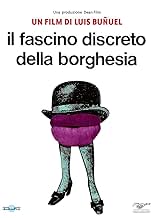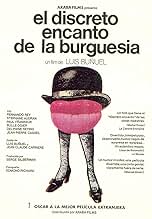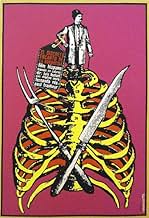Le charme discret de la bourgeoisie
- 1972
- Tous publics
- 1h 42m
IMDb RATING
7.7/10
49K
YOUR RATING
A surreal, virtually plotless series of dreams centered around six middle-class people and their consistently interrupted attempts to have a meal together.A surreal, virtually plotless series of dreams centered around six middle-class people and their consistently interrupted attempts to have a meal together.A surreal, virtually plotless series of dreams centered around six middle-class people and their consistently interrupted attempts to have a meal together.
- Director
- Writers
- Stars
- Won 1 Oscar
- 7 wins & 9 nominations total
Stéphane Audran
- Alice Sénéchal
- (as Stephane Audran)
- Director
- Writers
- All cast & crew
- Production, box office & more at IMDbPro
Featured reviews
The systematic analysis of this film would be in my opinion a gigantic task, since there are so many topics, stories and references intermingled in the chaotic way the surrealists are so fond of. I think the two main topics -sometimes in surrealism there is not even one- are dreams and transgression of social norms and traditions. The film is articulated on linked-up situations: five gatherings of a group of bourgeois friends and four stories, four dreams which are dreamt by different characters. The suppers are more common in the first part of the film, and the dreams on a second part, but they alternate with each other and with other episodes, like that of the terrorist girl. At the beginning things seem not to turn out good: right the first thing we see is the perplexity of the guests to M. Senechal house when they are told the supper was planned for the next day. 'But that is impossible', says Acosta, 'I couldn't have accepted, tomorrow I'm busy'. Contradiction with no explanation, right the same way as things happens in a dream, where we accept the reality of what we dream without explanations, even if it is impossible or contradictory with something else -dreams are the core of surrealism and of this film. This baffling beginning really impressed me. There is contradiction and kind of a difficulty to do things in every single detail in the next sequence: Mme and M Senechal are invited to dine out, but she has to change. The restaurant 'n'a pas l'air gai', and the door is locked. They knock and they are invited in. The owners have changed. There is no people and the prices are cheap. Everything is suspicious. And then the first punch of the story: the manager died that afternoon and the wake has been set in the dining room since the undertaker has not yet arrived. Of course, the bourgeois leave. This is the first reference to death, a constant theme either in surrealism, in dreams and in this film. It seems as if the whole film was a dream. Within the context things are logical and normal -or seem logical and normal- to the characters, and their reactions are 'contextually' logical too, but from the outside the stories in the film are as odd as any dream we can have. E.g., when Acosta shoots the terrorist girl from his window, or when the army appeared at M. Senechal's house, or even when the bishop tells M Senechal that he wants to be the family gardener. They are baffled, but they accept the things that happen, as we are baffled by or dreams but accept their logic when we are dreaming. Social transgression is based on a subtle but scorning parody of the bourgeois class and their customs and beliefs. The bourgeois are classy, and conceited: they show off their vain culinary knowledge every time they host a supper. M. Thevenot boasts that 'discreet charm' of the bourgeois when he subtly makes fun of the chauffeur: he does not know how to drink a Martini. Later on, Acosta cheats on Thevenot when he tells him that he has to show his wife the 'sursiks'. Thevenot does not know what that is, but he is an hypocrite not to say it. The bourgeois are also extremely fond of the lowest vices and they enjoy them gaily -I do not think, on the other side, that Buñuel is condemning them, but the hypocritical attitude of the bourgeoisie. Drug trafficking and consumption, lust, alcohol. The commentaries about the younger girl vomiting and dirty nails and her ignorance (the complex of Euclides, she says at some point) point out -and laugh at- the hypocrisy in the values of the middle-high classes. Also the Church and the Army are criticized. The Bishop, a main head of the Church, is humble -a extremely acid irony- but will mercilessly kill a poor man that will die anyway -that adds to the cruelty. The Bishop is also ignorant: he does not know where the Republic of Miranda is. The soldiers and officers smoke marihuana and praise it, they even are connoisseurs! -'Mexico or Congo?', the general asks, referring to the origins of the product.. The dreams come over mainly in the second part of the film. Both the two first of them are dreamt by soldiers. I really enjoyed them. In the first one I see a little bit of a reference of the life in Spain on the times when Buñuel was a kid -I do not know Buñuel's early life in Spain, but I presume there could be some autobiography. The looks of the parents of the young soldier, their clothes and the strict, militarist attitude of the father made me think of the Spanish family life in the turn of the century XIX to XX. I also liked the second dream. The dark and blurry street and house and the background noise make a great dreamy scene. In this dream, the soldier meets a dead friend. Then another friend comes over, and makes him realize that it is impossible. Sometimes in real dreams this happens too. Something happens and then, with no explanation, we realize that is impossible. It also should be pointed out that these two dreams share two primal human topics: motherly feelings and fear to death. The topic of death is present in some other dreams: the general's, in which Acosta shoots him dead; or the dream about the ghost of the sergeant. Another primal fear is dealt with in Senechal's dream: shame. They are caught in a theater stage while they are having dinner -this is a recurrent dream that sometimes takes other forms: being naked in the middle of the street or lying on your bed wearing you pajamas in your classroom. I also found humor all over the film: funny situations such as the bishop offering himself as a gardener, or the straws in M. and Mme. Senechal hair. Acosta playing tricks on Thevenot, or the soldiers happily smoking joints and listening to a 'sympa' dream. But I do not know if Buñuel is trying to be funny or only to transgress. And that transgression is hilarious because it reveals the hypocrisy of society.
"The Discreet Charm of the Bourgeoisie", a leisurely paced, incisive satire on social mores and class hypocrisy, opens with a group of friends arriving on the wrong day of a dinner engagement. this is only the begining of a succession of unexpected and unusual events to follow. The dinner party is the movie's main setting and it is there that reality and illusion often times blend imperceptibly together. The film is structured as a series of surreal sequences, which prompted esteemed film critic Pauline Kael to opine 'His(Director Louis Bunuel) indifference to dramatic logic is complete.' And how. Bunuel's narrative plays an elaborate game with the viewer through it's subconscious imagery and audacious use of time. His tendency to experiment with technique and form often times led to discovery and innovation. The cinema of Louis Bunuel invariably deals with the discrepancy between appearance and reality; decorum and desire. His world view was subversive and anarchistic. He was a cheerful pessimist, skeptical but not susceptible to Bergmanian despair. His skepticism extended to all of those he found playing too neat a social game. The filmmaker's career was one sustained assault on authoritarianism. Witness an indiscreet character in the film who claims: 'No one system can help the masses acquire refinement.' He believed man was, unconsciously, a slave to custom and aimed to shock viewers out of their unthinking acceptance of established values. "The Discreet Charm of the Bourgeoisie"(An Academy Award winner in 1972 for Best Foreign Film) is a boldly inventive picture. Dozens of frames are filled with clever filmic devices: environmental noises increase inordinately during routine conversations; an ambiguous procession is inserted freely within the text. These cinematic ploys add intrigue to the already peculiar goings-on. The walk by the main group of characters along a country roadside is mysterious and compelling. The players are noticeably silent and contemplative. Is this an anxious dream? The afterlife? An insignificant flashback? Whichever, the recurring sequence underscores the obliqueness and cool obscurity of the film. One might not identify closely with the disenchanted Bunuelian sensibility or the unsentimental stance he takes, however one knows immediately and unmistakably that they are in the gifted hands of a film technician like a Godard or Kurosawa. A director in complete control of his medium. A highly personal filmmaker frequently referred as 'a poet of hallucination who follows the caprices of his fantastical imagination.' Someone whose fanciful paths of creation were invariably led by the irrational. "The Discreet Charm of the Bourgeoisie", with it's arresting mixture of calculation and carelessness, remains a unique and influential movie. The acerbic films of Robert Altman and the perverse mischievousness of the Coen brothers films, to mention but a few, pay a large debt to the strange universe and unconventional perspective of Louis Bunuel. Film lovers uninitiated in surrealist cinema will find "The Discreet Charm of the Bourgeoisie" an alluring and beguiling crash course.
Director Luis Bunuel is often described as a surrealist, but the word misapplied in reference to his later works, where the the term absurdism is much more appropriate. Such is the case with the Academy Award-winning THE DISCREET CHARM OF THE BOURGEOISIE, which begins with four friends who arrive at their hosts' home only to discover they have arrived on the wrong night--a plausible situation. But before the film has run its course, Bunuel unravels his tale of a meal that never quite happens in the most unexpected ways imaginable.
The film works on several levels, mocking social conventions, the church, and eventually spilling its action into a series of overlapping nightmares in which various attempts to dine are frustrated by everything from the corpse of a restaurant manager in a nearby room to military maneuvers. On one memorable occasion, the friends are invited to dine and are seated around an elegant table--when a curtain suddenly rises behind them and reveals them to be seated on a stage before a hostile audience! The cast (which features Fernando Rey, Delphine Seyrig, Paul Frankeur, Bulle Ogier, Stephane Audran and Jean-Pierre Cassel as the constantly frustrated diners) plays with considerable aplomb, performing the most irrational scenes with a magnificent realism. When combined with Bunuel's absurdist story, the result is a disquieting yet often very funny discourse on frustrated appetites both real and imagined, and with many layers of incidental meaning along the way.
A word of caution to the uninitiated: Bunuel is not for those who seek a tidy plot line with clear-cut meanings. But if you come to it with an open mind, you'll find plenty of food for thought!
Gary F. Taylor, aka GFT, Amazon Reviewer
The film works on several levels, mocking social conventions, the church, and eventually spilling its action into a series of overlapping nightmares in which various attempts to dine are frustrated by everything from the corpse of a restaurant manager in a nearby room to military maneuvers. On one memorable occasion, the friends are invited to dine and are seated around an elegant table--when a curtain suddenly rises behind them and reveals them to be seated on a stage before a hostile audience! The cast (which features Fernando Rey, Delphine Seyrig, Paul Frankeur, Bulle Ogier, Stephane Audran and Jean-Pierre Cassel as the constantly frustrated diners) plays with considerable aplomb, performing the most irrational scenes with a magnificent realism. When combined with Bunuel's absurdist story, the result is a disquieting yet often very funny discourse on frustrated appetites both real and imagined, and with many layers of incidental meaning along the way.
A word of caution to the uninitiated: Bunuel is not for those who seek a tidy plot line with clear-cut meanings. But if you come to it with an open mind, you'll find plenty of food for thought!
Gary F. Taylor, aka GFT, Amazon Reviewer
I'll be honest, I mostly like my movies to be conventional which simply means to me that they should have a beginning, middle and ending, plus a credible plot and believable characters. I've never cottoned on to the cinema of the surreal or the absurd and have always thought you can keep all that Coen Brothers or Pedro Almodovar stuff away from my door.
But, I live in Spain now and I have a learned Spanish neighbour who has encouraged me to watch some Spanish cinema particularly the films of Bunuel and so a few months ago I made a point of watching his earlier work "Viridiana" which I very much enjoyed and deciding to dip into his repertoire again, selected this particular movie, even if it was produced in France, as it seems to be his best known and perhaps most celebrated work. So glad I did.
Did I perceive every nuance of the director's intentions? Probably not. Did I understand the bigger arguments he was making, which to be fair is pretty much all there in the title? I think so though I can't be sure. Was I kept watching all the way through down to the delicious combination of intrigue, amusement and curiosity? Absolutely!
The narrative is simple. Three male-female couples want to sit down to dinner in modern-day France. The males are all in some way connected to the governance of an imaginary French protectorate in South America called Miranda with the most prominent among them being Fernando Rey as the country's ambassador, but all six are of the distinctly upper class set.
But don't be fooled into thinking that these suited and booted individuals are pillars of society. Far from it. As well as apparently having designs on each other's wives we also see that the three men are involved in the illegal trafficking of heroin.
It seems that every time they sit down to eat, an ever more bizarre outside intervention takes place before they can put the food to their lips. Much later Bunuel interjects into the narrative the dreams of a young French army officer who just happens along and then the daydreams of the lead characters themselves some of which in fact overlap the dreams of the others. Some of these are eerie, while others are comical.
If pushed, yes I can see the film attacking the governing elite, here shown as corrupt and without morals, but it's more the individual scenes that stay in the memory such as the shocking sequence when the local bishop, who joins the group, oddly enough as a gardener, later cold-bloodedly shoots dead an already dying man after he learns that years ago the man was the never-caught killer of his own parents or when the six are slaughtered Romanov-style by presumably Miranda freedom-fighters near the end.
But I also love the comic touches like when the group discover themselves playing themselves on stage in front of a baying audience, or when an important telephone conversation is drowned out by the sound of aircraft flying overhead in an almost Woody Allen-type moment. The funniest of many in the film for me was the sight of Ray's character giving himself away to the Miranda assassins by reaching up to the table under which he is concealed for a piece of duck he's waited all movie-long to taste.
Listen, don't ask me to write an essay on this film. All I know is that I found it very original, entertaining and funny in equal measure. A moveable feast in fact.
But, I live in Spain now and I have a learned Spanish neighbour who has encouraged me to watch some Spanish cinema particularly the films of Bunuel and so a few months ago I made a point of watching his earlier work "Viridiana" which I very much enjoyed and deciding to dip into his repertoire again, selected this particular movie, even if it was produced in France, as it seems to be his best known and perhaps most celebrated work. So glad I did.
Did I perceive every nuance of the director's intentions? Probably not. Did I understand the bigger arguments he was making, which to be fair is pretty much all there in the title? I think so though I can't be sure. Was I kept watching all the way through down to the delicious combination of intrigue, amusement and curiosity? Absolutely!
The narrative is simple. Three male-female couples want to sit down to dinner in modern-day France. The males are all in some way connected to the governance of an imaginary French protectorate in South America called Miranda with the most prominent among them being Fernando Rey as the country's ambassador, but all six are of the distinctly upper class set.
But don't be fooled into thinking that these suited and booted individuals are pillars of society. Far from it. As well as apparently having designs on each other's wives we also see that the three men are involved in the illegal trafficking of heroin.
It seems that every time they sit down to eat, an ever more bizarre outside intervention takes place before they can put the food to their lips. Much later Bunuel interjects into the narrative the dreams of a young French army officer who just happens along and then the daydreams of the lead characters themselves some of which in fact overlap the dreams of the others. Some of these are eerie, while others are comical.
If pushed, yes I can see the film attacking the governing elite, here shown as corrupt and without morals, but it's more the individual scenes that stay in the memory such as the shocking sequence when the local bishop, who joins the group, oddly enough as a gardener, later cold-bloodedly shoots dead an already dying man after he learns that years ago the man was the never-caught killer of his own parents or when the six are slaughtered Romanov-style by presumably Miranda freedom-fighters near the end.
But I also love the comic touches like when the group discover themselves playing themselves on stage in front of a baying audience, or when an important telephone conversation is drowned out by the sound of aircraft flying overhead in an almost Woody Allen-type moment. The funniest of many in the film for me was the sight of Ray's character giving himself away to the Miranda assassins by reaching up to the table under which he is concealed for a piece of duck he's waited all movie-long to taste.
Listen, don't ask me to write an essay on this film. All I know is that I found it very original, entertaining and funny in equal measure. A moveable feast in fact.
In Paris, the ambassador Don Rafael Acosta (Fernando Rey) of the South American country Miranda, who is also an smuggler of cocaine, comes to a dinner part in the house of Henri (Jean-Pierre Cassel) and Alice Sénéchal (Stephane Audran) with their common friends M. Thevenot (Paul Frankeur), his wife Simone Thévenot (Delphine Seyrig) and her sister Florence (Bulle Ogier) but on the day before the scheduled. Henri is not at home and they invite Alice to go with them to a restaurant close to her house, but an incident does not allow them to have meal together in the place. They reschedule another meal together many times, but problems occur in every occasion and they do not succeed in their intent.
"Le Charme Discret de la Bourgeoisie" is one of the funniest movies of the master of the surrealism Luis Buñuel. This intellectual director was a great critic of the values of the Bourgeoisie Class and this movie is a witty joke, blurring the fears this class with reality and nightmare, and open to the most different interpretations. The empty, hypocrite and pointless existence of the Bourgeoisie Class is highlighted by the shallow interest of the characters in meal, sex, etiquette and money and their final journey to nowhere; or the behavior of the disloyal ambassador that betrays his friend having a love affair with his wife; smuggles cocaine using his diplomatic immunity; or shoots the toy of a terrorist in front of the Embassy of Miranda. Further, in 1972, the countries of South America lived under military dictatorship with many exiled people living in Paris, and the arrogant Don Rafael Acosta is hilarious denying the truth about his country. Buñuel does not spare the church in his satire, with the funny Monsignor Dufour trying to interfere in every subject without the appropriate knowledge. My vote is eight.
Title (Brazil): "O Discreto Charme da Burguesia" ("The Discreet Charm of the Bourgeoisie")
"Le Charme Discret de la Bourgeoisie" is one of the funniest movies of the master of the surrealism Luis Buñuel. This intellectual director was a great critic of the values of the Bourgeoisie Class and this movie is a witty joke, blurring the fears this class with reality and nightmare, and open to the most different interpretations. The empty, hypocrite and pointless existence of the Bourgeoisie Class is highlighted by the shallow interest of the characters in meal, sex, etiquette and money and their final journey to nowhere; or the behavior of the disloyal ambassador that betrays his friend having a love affair with his wife; smuggles cocaine using his diplomatic immunity; or shoots the toy of a terrorist in front of the Embassy of Miranda. Further, in 1972, the countries of South America lived under military dictatorship with many exiled people living in Paris, and the arrogant Don Rafael Acosta is hilarious denying the truth about his country. Buñuel does not spare the church in his satire, with the funny Monsignor Dufour trying to interfere in every subject without the appropriate knowledge. My vote is eight.
Title (Brazil): "O Discreto Charme da Burguesia" ("The Discreet Charm of the Bourgeoisie")
Did you know
- TriviaThe movie includes three of Luis Buñuel's recurring dreams: a dream of being on stage and forgetting his lines, a dream of meeting his dead cousin in the street and following him into a house full of cobwebs, and a dream of waking up to see his dead parents staring at him.
- GoofsAfter Rafael gives the terrorist champagne, his position in the chair changes between shots.
- Quotes
Rafael Acosta: You're much better suited for making love than for making war. Vamos, muchacha. Vamos.
- ConnectionsFeatured in Pour le cinéma: Episode dated 16 September 1972 (1972)
- How long is The Discreet Charm of the Bourgeoisie?Powered by Alexa
Details
- Release date
- Countries of origin
- Official site
- Languages
- Also known as
- El discreto encanto de la burguesía
- Filming locations
- Production company
- See more company credits at IMDbPro
Box office
- Budget
- $800,000 (estimated)
- Gross US & Canada
- $82,471
- Opening weekend US & Canada
- $6,075
- Jun 26, 2022
- Gross worldwide
- $103,230
Contribute to this page
Suggest an edit or add missing content

Top Gap
By what name was Le charme discret de la bourgeoisie (1972) officially released in India in English?
Answer



































